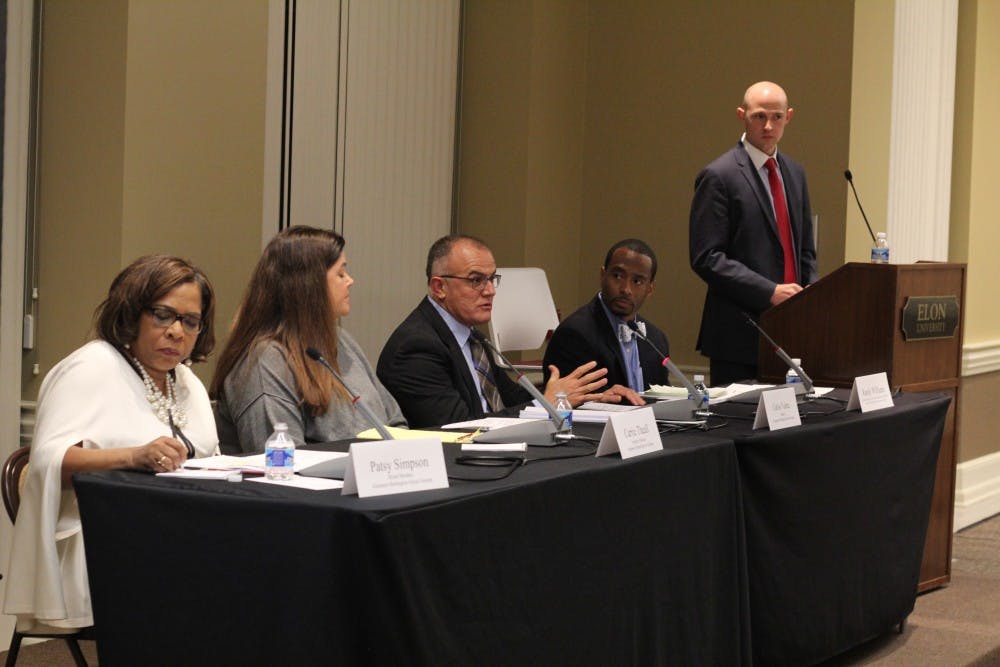Elon University and The Burlington Times-News partnered for its final Community Connections installment of the academic year Monday night, “Education, Race and Ethnicity in Alamance County and Beyond.”
The event was the final installment in a series focused on race relations in Alamance County and the broader United States.
Sponsored by the Council on Civic Engagement, Jason Husser, assistant professor of political science and policy studies, moderated the panel discussion attended by roughly 70 members of the Elon community.
“We are here to create a thoughtful dialogue,” Husser said. “Our panelists are here to open discussion on issues of race and education.”
Carrie Theall, executive director of the Alamance Partnership for Children, Patsy Simpson, board member of the Alamance-Burlington school system, Carlos Valera, teacher in the Alamance-Burlington School System and Randy Williams, presidential fellow, special assistant to the president and dean of multicultural affairs at Elon, comprised the evening’s panelists.
Before the discussion began, Husser presented a quote from former President Lyndon B. Johnson.
“‘Until justice is blind to color, until education is unaware of race, until opportunity is unconcerned with the color of men’s skins, emancipation will be a proclamation but not a fact,’” Husser recited.
Simpson used the quote as a stepping-stone to discuss the current educational climate in Alamance County as it pertains to race.
She said education is one of the strongest tools for substantive reform and social growth.
“Education opens doors,” Simpson said. “My parents were very poorly educated and dedicated their lives to making sure me and my siblings got an education they never did. It’s unfortunate that today, economics still disallows children from having access to proper education.”
Williams added to her point by highlighting race as the No. 1 cause of disparity in education in Alamance County schools.
“The data is consistently overwhelming when it comes to race and education,” Williams said. “It is very common that race is the No. 1 director of educational outcome.”
Much of the evening’s discussion was subsequently centered on diversity in education.
The panelists themselves were a diverse group — Simpson and Williams are African-American, Theall is Caucasian and Valera is Venezuelan.
Valera emphasized the need for diversity not only in racial makeup but also in educational methodology when dealing with non-white students and non-English speakers.
“One of the biggest challenges we have is in diversity,” Valera said. “Our students are living different realities but are expected to achieve the same goals. It takes a person three to five years to achieve social English, and between seven to 10 years to achieve an academic level of English.
“Try to imagine someone coming to this country at nine years old. At minimum they would be 16 before they could be sufficient in academic English, and by that time it may be too late.”
Valera suggested potentially testing students in their native tongue but recognized it could be a tremendous strain on the county’s educational facilities.
As the discussion progressed, Theall touched upon the roots of educational discrimination and how they begin to form.
She said students can often experience racial disadvantage before starting kindergarten.
“The biggest group of children suspended or kicked out of preschool or child care centers are black males,” Theall said. “By the time they get to kindergarten, they are already lacking confidence required to excel.”
Simpson added that the effects of inequality tend to snowball, with the most noticeable differences being in high school students.
“There are a disproportionate amount of whites in our gifted programs,” Simpson said. “I don’t find this to be a systemic issue that punishes individuals, but it is hard to ignore that certain races are more disadvantaged.”
The floor eventually opened to questions from audience members relating to challenges the United States faces today.
Williams said a lack of acknowledgement of the role of race in the country’s history is to blame for many issues they see in their work.
“The first Africans were brought here on a Dutch ship in 1619,” Williams said. “The Emancipation Proclamation was written in 1863. In 1954, the Supreme Court ruled that ‘separate but equal’ laws were unconstitutional ... We need to address the monster of race for what it is in our society, or we will never overcome these issues.”


